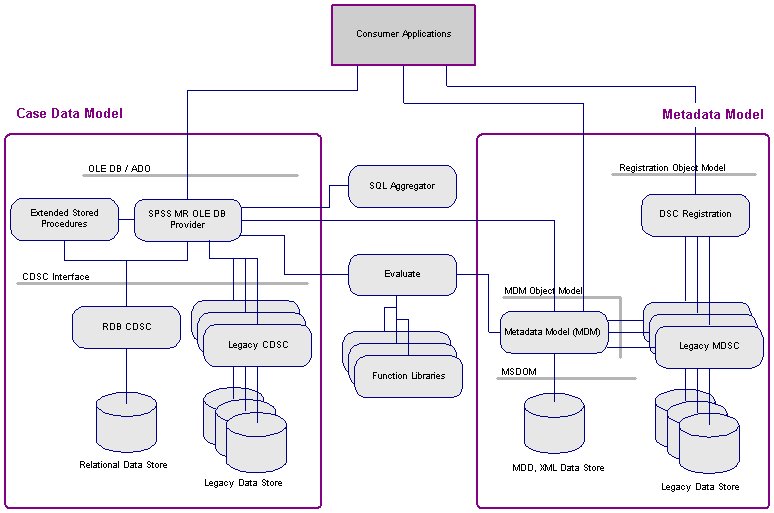Architecture of the UNICOM Intelligence Data Model
The UNICOM Intelligence Data Model has the following main components:
UNICOM Intelligence OLE DB provider
This component, referred to as the Provider, implements the case data OLE DB provider. OLE DB is a set of COM interfaces that provide a standard interface to data. Where possible, the OLE DB COM interfaces have been developed using the ATL OLE DB provider templates. The Provider implements the following:
▪SQL parser. Commands executed against the Provider are made using a subset of the ANSI SQL Grammar. The SQL parser has been implemented using Visual Parse++.
▪Rowset Accessor. Any OLE DB/ADO recordsets that are returned by the Provider are implemented using a dynamic rowset accessor.
▪SQL Engine. The SQL engine implements the interface with the parser, and the SQL Aggregator and Evaluate components for expression evaluation. It uses the services provided by the connected CDSC to bind to tables and columns and obtain and update data.
Extended stored procedures
This component is used to implement stored procedure syntax. For example, the synchronization of the MDM and CDM is executed using an extended stored procedure. This component makes it possible for third parties to implement their own stored procedures.
Case Data Source Component (CDSC) Interface
This is a COM interface for exposing basic data services to the Provider. The data services have been split from the Provider so that new data sources can easily be implemented using Visual Basic or any other COM-enabled programming language.
Relational MR Database Case Data Source Component (CDSC) (mrRdbDsc.dll)
This component implements the CDSC interface for read/write access to a relational database.
Legacy case data source components (CDSCs)
These components implement CDSCs for legacy case data stores, such as Quanvert, SPSS, and so on.
SQL aggregation (mrAggregate.dll)
This component implements the SQL summary functions of AVG, Base, Count, Sum, Min, Max, and STDEV.
Evaluate (mrEvaluate.dll)
This component implements expression parsing and evaluation for the Provider. This component is also used by the Metadata Model (MDM) for parsing derived variable and filter syntax. After an expression is parsed, the Evaluate component returns a p-code based evaluation engine that is used for variable binding and expression execution.
Function libraries (mrFuncLib.dll)
These are used to add functions to the expression syntax. Expression libraries are implemented using the standard COM interfaces that are used by the VBA, Excel, and OLAP function libraries.
Data Source Component (DSC) Registration Component (mrDSCReg.dll)
This is used for enumerating case and metadata DSCs. This component can be used by user-applications to browse available DSCs and to select a DSC from which to load a document.
Metadata Source Component (MDSC) Interface
This is a COM interface for exposing metadata. The interface is very simple, consisting of a single method. The method takes a connection string, which is typically the path to the metadata file or folder, and returns an MDM document.
Metadata Model (MDM) and Metadata Object Model
The MDM component and its associated object model are used for accessing the metadata.
See also

